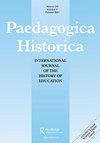教育问题的社会化和二十世纪之交墨西哥文盲率的上升
IF 0.3
4区 教育学
Q4 EDUCATION & EDUCATIONAL RESEARCH
引用次数: 0
摘要
在过去的二十年里,跨学科对社会概念变性的推动已经将社会历史的对象历史化了。在本文中,我提出了一种研究教育社会史的方法,它避开了将社会作为先验或前话语对象的前提。我的中心观点是,观察教育问题的社会化过程是可能的。这意味着社会和社会不仅仅是创造新的知识对象的概念,而是成为一种可视化原则,允许对类别进行抽象,并使一系列关系可以观察到。这些概念包含在社会问题是如何产生、观察、执行和由教育和政治行动者采取行动的过程中。我将通过检查文盲(西班牙语为analfabetismo)作为20世纪头几十年墨西哥的一个社会问题的产生来做到这一点。我认为有两个基本过程使文盲成为一个社会问题。首先,统计知识和方法的发展使人们有可能知道不识字的人数,从而将文盲作为一个统计类别。第二点是教育专家和权威将这一统计现实作为一个普遍问题加以阐述。从这个意义上说,识字被抽象和框定为现代社会正常运转的基本特征。本文章由计算机程序翻译,如有差异,请以英文原文为准。
The socialisation of educational problems and the rise of illiteracy in Mexico at the turn of the twentieth century
ABSTRACT In the past two decades, the interdisciplinary push to denaturalise the concept of society has historicised the very object of social history. In this paper, I propose a way of studying the social history of education that eludes the presupposition of the social as a transcendental or pre-discursive object. My central claim is that it is possible to observe a process of socialisation regarding educational problems. This means that the social and society were not simply concepts that created a new object of knowledge, but rather that they became a visualisation principle that allowed for the abstraction of categories and made observable a set of relationships. These notions are contained and articulated in how social problems were produced, observed, performed, and acted upon by educational and political actors. I will do this by examining the production of illiteracy (analfabetismo in Spanish) as a social problem in Mexico in the first decades of the twentieth century. I argue that two fundamental processes rendered illiteracy a social problem. First, the development of statistical knowledge and methods made it possible to know the number of people who did not read and write, creating the illiterate as a statistical category. The second is the articulation of this statistical reality as a generalised problem by education experts and authorities. In this sense, literacy was abstracted and framed as an essential feature for the proper functioning of a modern society.
求助全文
通过发布文献求助,成功后即可免费获取论文全文。
去求助
来源期刊

PAEDAGOGICA HISTORICA
Multiple-
CiteScore
0.90
自引率
40.00%
发文量
72
期刊介绍:
"Paedagogica Historica is undoubtedly the leading journal in the field. In contrast to a series of national journals for the history of education, Paedagogica Historica is the most international one." A trilingual journal with European roots, Paedagogica Historica discusses global education issues from an historical perspective. Topics include: •Childhood and Youth •Comparative and International Education •Cultural and social policy •Curriculum •Education reform •Historiography •Schooling •Teachers •Textbooks •Theory and Methodology •The urban and rural school environment •Women and gender issues in Education
 求助内容:
求助内容: 应助结果提醒方式:
应助结果提醒方式:


